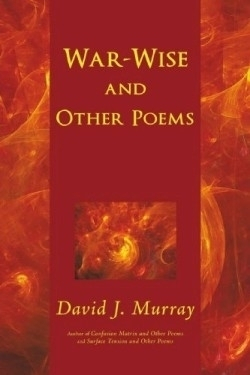War-Wise
and Other Poems
The muses have worked their magic with a new collection of poetry penned by David J. Murray. Whether the subject is war, wit, or beauty, these elegant, cerebral poems stretch the mind and prompt reflection. War Wise is the third collection of poems by this professor emeritus of psychology at Queen’s University in Ontario, Canada.
Part one of the book contains pieces inspired primarily by Murray’s experiences as a youngster during World War II in Manchester, England. The war is viewed through the eyes of a child, but the adult poet crafts the horrors of its larger meaning. In “For You,” Murray’s childhood innocence is forever lost through his cinematic experience. His youthful understanding of the world is enjoyable as he watches Mickey Mouse, romances, and good triumphing over evil in Westerns. Then come shocking documentaries that depict Holocaust victims—things that “would never go away from our tender-hearted minds.” His worldview changes forever.
In other poems, Murray writes of backyard Anderson shelters, D-Day, fear, air raids, and bullies, primarily the schoolyard kind. At the conclusion of “Memoir #2,” after he has successfully fought a tormentor, Murray writes, “but, on that day, I learned that a bully, if bullied, will stop.” Though it is not stated, this appears to be a reference to fighting against Hitler and his armies.
The collection’s second half, titled “One Hundred Mood Studies,” contains short, vocabulary-rich pieces that allow the poet to practice and hone his skills, much as musicians do through etudes. Each poem takes its title from a word in the first line, with at least one poem per alphabet letter. Most are written in the style of a Shakespearean sonnet. Although the rhyming pattern may be his own, or written with a nod to the Italian style, Murray’s sonnets contain three quatrains, plus a rhyming couplet that delivers the summary punch. Some studies are “connected” as the poet mulls a concept, such as “eyes” or “night.”
Titles tease content. A poem about light is as much about its absence as its presence. “Wit” speaks of wit and laughter gone.
In the sonnet tradition, Murray writes of romance, hidden longing, a graying beard’s desire for a younger woman, the sadness of aging, and feelings of possessive love. He is sentimental but not mawkish. His imagery and word use is provocative, as in “whisper-itching cold.”
Murray’s wit is evident in “Opportunity,” in which the narrator tries to admire a woman’s mind and keep things non-romantic: “But, when she demurred, he abandoned his silly scheme; He’d learned that he was not as pure as he might seem.” He also considers poetry itself. In “Marginality,” poetry reveals, “I am the living dream,” causing him to reflect that he seeks “new words to buoy me yet.”
This poetry entices readers to reread Murray’s gems and hope for “new words” in future collections.
Disclosure: This article is not an endorsement, but a review. The publisher of this book provided free copies of the book and paid a small fee to have their book reviewed by a professional reviewer. Foreword Reviews and Clarion Reviews make no guarantee that the publisher will receive a positive review. Foreword Magazine, Inc. is disclosing this in accordance with the Federal Trade Commission’s 16 CFR, Part 255.

